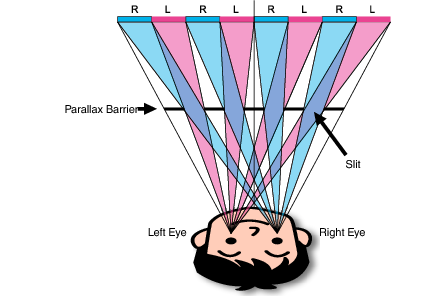Getting Started |
Precautions on Playing Back 3D Images (for GZ-HM960) |
Images recorded in 2D mode can be converted to 3D and played back on this unit. You can enjoy realistic and powerful 3D images by playing back on a 3D compatible TV. Before use, please read the following precautions to ensure safe and comfortable viewing of the 3D images.
Playing Back 3D Images
This unit makes use of the misalignment between the images that enter the left and right eyes to create the 3D effect during 3D playback. As the images that enter the left and right eyes are different, fatigue may be experienced. In addition, depending on the content of the video, an illusion of movement may be experienced and result in motion sickness.
3D Display on the LCD Monitor
3D images are supported by the LCD monitor. Press the “3D” button to change the display on the LCD monitor between 3D and 2D.
3D effect appears stronger when viewed at appromimately 30 cm from the front.
3D effect may be weak if viewed from an angle other than the front.
The LCD monitor appears darker when 3D images are displayed. Change the display to 2D when it is difficult to see, such as when using this unit outdoors.
Caution
- Viewing of 3D images is not recommended for people with medical history of photosensitivity, with heart diseases, feel unwell, suffer from lack of sleep, suffer from fatigue, or are drunk.
- If you have vision problems such as short-sightedness, long-sightedness, varying vision in the left and right eyes, or astigmatism, it is recommended to correct your vision by wearing glasses, etc.
Stop viewing of 3D images if you see double images. - Stop viewing of 3D images if you experience fatigue or discomfort.
- If you experience fatigue or discomfort while viewing 3D images on the LCD monitor, set the display to 2D.
- Rest well after viewing 3D images.
- Take a break every 30 to 60 minutes when viewing 3D images.
- Keep a distance of at least 3 times the effective height of the screen when viewing of the 3D images on a 3D compatible TV.
- Viewing of 3D images is only recommended for ages 5 to 6 and above.
Medical conditions may worsen.
3D images may appear differently for different people. Correct your vision appropriately before viewing the 3D images.
Continual viewing of the 3D images may result in health problems.
Take an adequate rest.
Viewing of 3D images in an environment where shaking of the monitor is expected, such as while riding in a vehicle or during walking, may result in fatigue or discomfort.
Continual viewing of the 3D images may result in health problems.
After viewing 3D images, check that you do not experience fatigue or discomfort before driving, etc.
Long periods of viewing may cause visual fatigue.
Viewing of the 3D images from a distance shorter than the recommended distance may cause visual fatigue.
| TV Size | Recommended Distance |
|---|---|
|
54” |
Approx. 2.0 m (6’6-3/4”) |
|
50” |
Approx. 1.9 m (6’2-3/4”) |
|
46” |
Approx. 1.7 m (5’6-7/8”) |
|
42” |
Approx. 1.6 m (5’3”) |
Guardians should pay close attention to children as health problems may result if fatigue and discomfort are not noticed immediately.
3D Effect Mechanism

3D images on the LCD monitor of this unit are displayed using the parallax barrier system. Placed in front of an image source, a parallax barrier consists of a series of slits arranged alternately for the left and right eyes, allowing each eye to see a different image when viewing from a distance, thus creating the 3D effect. As such, 3D effect may appear weak depending on the angle of viewing.
